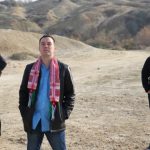Share on facebook
Facebook
Share on twitter
Twitter
Share on linkedin
LinkedIn
Indigitous #HACK is a global missional hackathon to bring the Gospel to new people, places, and spaces. Since our first event in November 2016, thousands of people have gathered in locations around the world to use their talents for God.
Participants at the events are pitched challenges that are impacting the world around them and have an opportunity to develop solutions to those problems. At the end of a weekend of hacking, projects will be at various levels of completion. Sometimes teams develop a prototype while other times they’re actually able to deliver a minimum viable product (MVP).
Participants at #HACK only commit to a weekend of missional work, but some get so inspired by the vision and by their work that they want to continue working on the projects to add features, fine-tune them, and bring them closer to completion.
Such was the case with each of these projects that began or received significant work at Indigitous #HACK and have continued to receive dedicated work from volunteers after the event.
The first Bible story in this language
In 2018, a missionary to the small island of Pukapuka came to an Indigitous #HACK event in Auckland, New Zealand and pitched a project to create Bible content in the Pukapuka language. Though the Bible is currently in the process of being translated in that language, there was at that time no finished biblical content that the people group could experience.
When none of the participants joined the project, city lead Karl Udy took it upon himself. With his iPad and an animation program, he created a simple animated video telling the story of Jesus calming the storm. Over a period of only eight hours, Karl created something that the Pukapuka people can watch to see a miracle of Jesus.
Seeing how easy it was to create simple animated content, Karl has led a similar process after #HACK with events he calls Indigitous Ed. With these single-day events, he led students in creating animated Bible content in Te Reo Māori, the indigenous language of New Zealand.
Anti-trafficking chatbot
In 2019, Sam and Roger bought a domain related to buying sex. They wanted to be able to speak to those who were paying for sex workers, to ask them questions, to educate them about the harmful effects of human trafficking, and to give them opportunities to turn away from that sin and toward God.
But they quickly realized that most people don’t find sex workers through a Google search and thus, weren’t ending up on that doman. People instead use online classified listings. So Sam and Roger created a chatbot and posted an ad on those online listings. The ad simply said, “If you’re looking to buy sex, there are things you need to know first.” The ad included a phone number.
Sam, Roger, and a team of volunteers responded to the texts but were quickly overwhelmed. They then created scripted responses from the chatbot but still needed more help. They then brought the project to Indigitous #HACK. “Four people signed up and started working with us. Within that weekend of #HACK, they added additional features to the chatbot that probably would have taken us a whole year,” Sam says.
Their goal is to use the chatbot as the first layer of screening. Once the conversation reaches a point where the chatbot isn’t able to answer, the person would be redirected to a live volunteer who would continue the conversation. The team that worked on the chatbot during #HACK is now partnering with some ministries to recruit volunteers to be those responders. With the help of those ministries, they’re now launching more online ads to increase their reach and talk to more people.
Covering a city in prayer
In 2019, Phil Hardwick’s church asked him if it’s possible to get people to prayer walk the entire city of Coventry, England and to be able to map those walks. Phil created the simple Prayer Walk app and launched it in June 2020.
In 2021, Phil pitched his app at a Kingdom Code/Indigitous #HACK event in London, as an opportunity to take it farther. Three participants joined his project and worked over the weekend to expand the scope of the app beyond the city of Coventry to the entire United Kingdom. They also moved the app from a binary visualization of whether or not a street has been prayed for to a heat map that shows how much prayer is happening. “It was great to see everyone united together” working on the project, Phil says.
The new, improved Prayer Walk app has been used to organize at least 19 different prayer walk events throughout the UK.
Living Atlas
During #HACK2021, participants across North America collaborated on a project to help answer the questions that non-Christians and nominal Christians have about the Bible. The project addressed the top Bible questions that people search online and answered them through a unique interactive map experience.
The interactive map, called Living Atlas, uses storytelling, videos, articles, and Scripture references to share Gospel stories in relation to where they occurred on the map. Going to a part of the map shows important biblical information, such as Jesus’ birth in Bethlehem, Jesus teaching at the temple at Jerusalem at age 12, and all the way through his ministry, his death, appearance after resurrection, and his appearance to Paul on the road to Damascus. A working project of the atlas is available now.
Join the next hackathon
These are just a few of the exciting projects that have been a part of Indigitous #HACK over the years. If you’re interested in using the talents God has given you to make an impact, we encourage you to join us this October for #HACK2022.
Run
Write the vision; make it plain on tablets, so he may run who reads it. (Habakkuk 2:2)
- Join us for Indigitous #HACK2022 this October.
Featured image taken at an Indigitous #HACK event.

